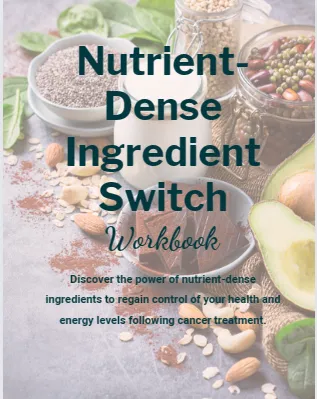My Blog

Free resource
Nutrient-dense ingredient Switch workbook
Download this workbook to follow 5-steps to eating better, increasing protein and energy in your diet and building up your strength following cancer treatment.

Discover Nutrient-dense ingredients to support recovery after cancer treatment
As a devoted oncology dietitian, witnessing the sheer joy and relief on my patients' faces as they embrace their last day of treatment is nothing short of breath-taking. It's a celebration of human resilience, a testament to the journey they've embarked on—and conquered. I’m humbled with every story shared.
Navigating treatment is like a full-time job—enduring, relentless. But then, there's that momentous day. Though the treatments like chemotherapy or radiotherapy linger in their effects, the body's innate ability to mend itself kicks-in.
Let's talk nutrition—vital from the get-go, yet sometimes it's overshadowed by the whirlwind of medications, exercises, and treatment protocols.
Cancer treatment can lead to weight loss and malnutrition, often due to diminished appetites or side effects. Yet, optimal nutrition can be a game-changer, supporting quality of life and treatment outcomes. Indeed, studies have indicated that early nutritional intervention can improve both weight stability and overall quality of life outcomes (1). It all begins with assessing caloric and protein intake and making dietary adjustments in small and simple ways.
Post-treatment, you may find your strength waning, the number on the scales lower, and a sense of being overwhelmed could linger. If you haven't had the support of a dietitian, fear not—I'm here to guide you through.
This blog post zeros in on the crucial weeks that follow treatment.
For some, the return to hearty meals like roast dinners is seamless, but for many, lingering symptoms cloud the once-simple pleasure of eating. Dry or sore mouths, dulled appetites, and taste changes can dish out frustration when "normal" eating seems just beyond reach.
As your dietitian, my focus remains steadfast—maximizing those "good eating days" and empowering you to sustain them. Bigger portion sizes may be off the table, but the spotlight turns to nutrient-density. Our aim? Ensuring every bite packs a punch with calories, proteins, vitamins, and minerals. Whether the goal is weight restoration or rekindling muscle strength, it's all about tailoring to your body’s needs, recognizing that "overweight" can coexist with malnutrition.
Feeding your recovery with the ideal nutrients and quantities means energising your body, maximizing calorie uptake, and leveraging high-quality proteins to protect and rebuild muscle strength. Remember, protein is the cornerstone for recovery, healing and muscle restoration.
Hydration is essential. There's a simple formula: 30ml/kg body weight for those over 65 years or 35ml/kg if younger. Grab your calculator and discover your ideal fluid intake.
Don't overlook essential fats either! A splash of olive oil or a pat of butter can introduce additional, vital calories. These fats play a crucial role in cell structures, supporting overall health.
Moreover, vitamins and minerals are the unsung heroes, facilitating critical body processes and bolstering the immune system. Attaining these through dietary changes can be surprisingly straightforward.
If you've read to this point, you're clearly committed to your post-treatment nutrition. Ready for the next step? Try my Nutrient-dense Ingredient Switch! Download the free guide, embrace its 5 steps, and celebrate every stride toward a nutrient-rich diet. No quest for perfection here—every small victory is a leap towards your personalised "normal."
I applaud your perseverance!
If you’re seeking personalised assistance, explore my "Side-by-Side" package for six weeks of bespoke support, including 1:1 consultations and a treasure trove of educational content and recipes.
Share your journey with me via DM or email, and for a sprinkle of inspiration, follow me on Instagram @theresacolenutrition—I've got some protein-packed recipe ideas coming your way!
Shine on, and thank you for connecting with me!
Warmest wishes,
Theresa
Reference:
1. Batukbhai BDO et al, 2020. Early nutrition intervention in cancer patients: A systematic review and meta-analysis. JCO 38, e14037-e14037
More posts coming soon

Contact
hello@theresacolenutrition.com
Mobile: +44 7817 212627

Theresa Cole RD Health & Care Professions Council Registration Number: DT08627
Copyright© Theresa Cole Nutrition 2024
